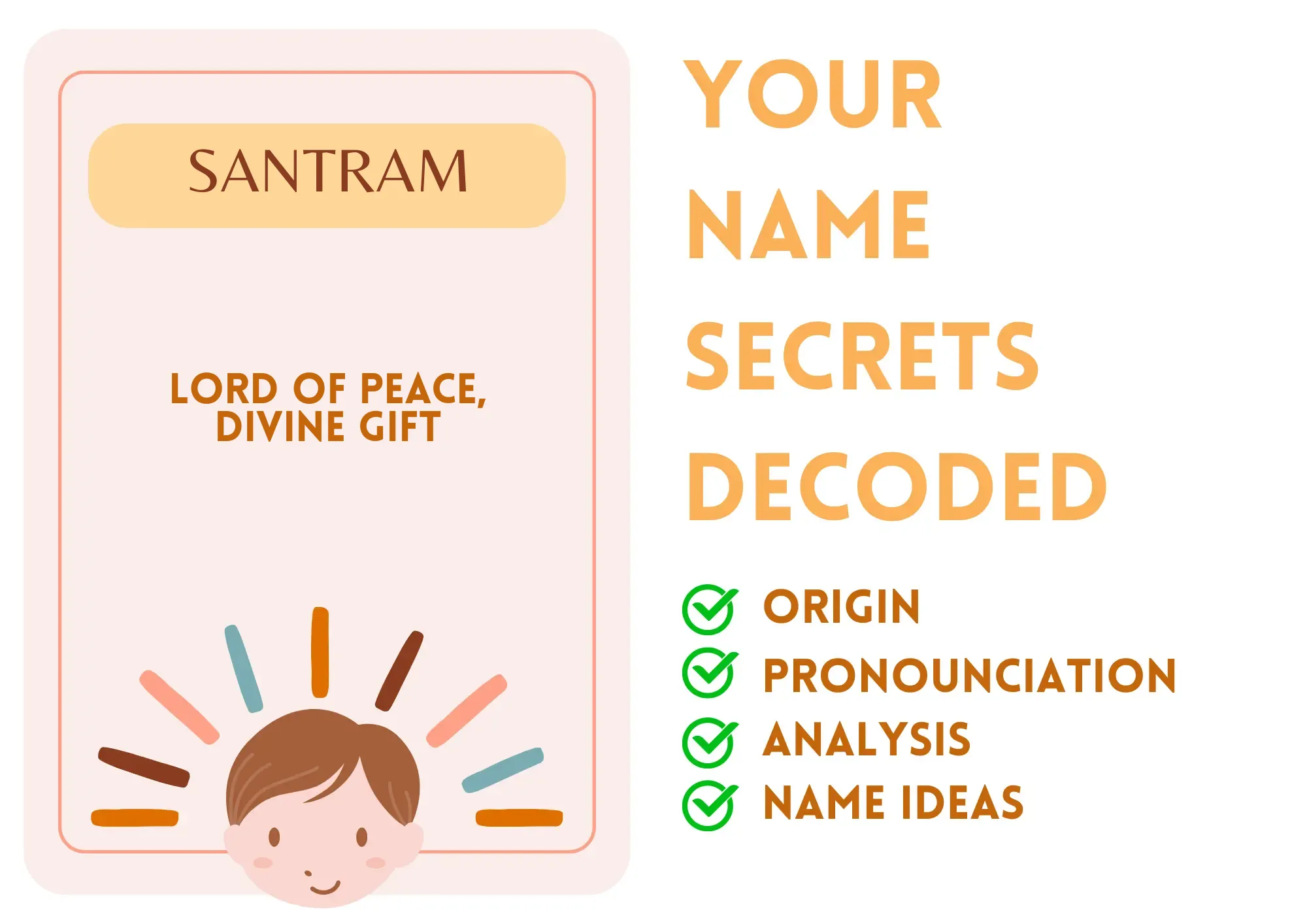
Santram
Santram is a distinctive name of Sanskrit origin, meaning 'Lord of Peace' or 'Divine Gift.' It is commonly used within Indian communities, particularly among Hindus. The name is predominantly masculine but can sometimes be used in a unisex context. Santram carries significant spiritual importance, often invoking connotations of tranquility and divine favor.
Widely perceived as positive, Santram evokes feelings related to serenity, spirituality, and blessings. It is relatively uncomplicated to write and pronounce, with minimal syllable variation, making it memorable.
While not as frequently immortalized in popular culture, its association with peace makes it a name treasured for its meaningfulness and traditional essence. Parents might choose Santram to reflect a desire for peace and spirituality in their child's life.
Basic Information
Gender: Boy
Sounds Like: suhn-trahm
Pronunciation Explanation: The first syllable 'suhn' is pronounced like 'sun,' and 'tram' rhymes with 'dram.'
Summary and Meaning
Meaning: Lord of Peace, Divine Gift
Origin: Santram has Indian origins, specifically linked to the Sanskrit language and Hindu traditions.
Usage: Santram is exclusively a masculine name, rooted deeply in male-centric cultural narratives.
Name Number (Chaldean)
Name Number (Pythagorean)
Name Constellation (Nakshatra)
Name Zodiac Sign (Rashi)
Popularity (Global Rank)
Overall: 53951
Boys: 54235
Most Popular in
Religious and Cultural Significance
Religion: Hindu
Background: In Hindu culture, Santram embodies peace and divine grace, making it a revered name among those seeking spiritual connection.
Cultural Significance: Santram is valued for its significant meaning and is often chosen for boys in search of a peaceful essence or spiritual guidance.
Historical Significance: Historically, Santram is associated with various religious texts and teachings promoting tranquility and benevolence as core spiritual ideals.
Popular Culture
Literature and Mythology: Though not widely recognized in specific mythological works, the tenets of peace associated with the name can be extrapolated from various Hindu teachings.
Movies and Television: Santram does not have notable appearances in mainstream media but embodies attributes often celebrated in Indian cinema—serenity, benevolence, and spirituality.
Feelings and Perceptions
Perception: Santram is perceived positively, with associations to peace, calmness, and a sense of divine blessing. It resonates well with parents desiring a name with gentle significance.
Positive Feelings: Peaceful, serene, unique, spiritually significant, blessed.
Negative Feelings: Relatively uncommon, may be unfamiliar to some, pronunciation could be challenging initially.
Practical Considerations
Ease of Writing and Calling: Santram is easy to write and pronounce, comprising seven letters and two syllables, making it simple and memorable.
Common Typos and Misspellings: Santar,Santrum,Santrum,Santramb
Common Nicknames: San,Tram,Ram
Santram Popularity
Santram Usage and Popularity By Country
| Country | Rank (Overall) |
|---|---|
| India | 10293 |
| United Arab Emirates | 67985 |
| Netherlands | 70785 |
| Germany | 81441 |
| United States | 539518 |
Santram Usage and Popularity By City
| City | Rank (Overall) |
|---|---|
| Delhi | 5558 |
| Bombay | 10845 |
| Lakhnau | 2173 |
| New Delhi | 6146 |
| Pune | 7309 |
| Aurangabad | 926 |
| Bhopal | 2283 |
| Karauli | 112 |
| Gurgaon | 5325 |
| Washim | 7800 |
Compatibility Analysis
Famous Persons Named Santram
No results found for Santram.
Related Names
Similar Sounding Names:
Santosh,Sanjay,Samrat,Siddharth